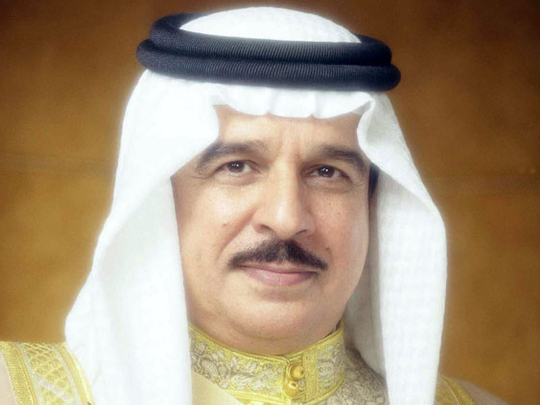
Manama: Bahrain's King Hamad Bin Eisa Al Khalifa reiterated his pledge not to allow journalists to be imprisoned.
"We are proud that since the launch of our reforms, the Kingdom of Bahrain has been completely free of any political prisoner or prisoner of conscience," King Hamad said.
"We will not accept that during our reign any journalist will be punished or that a newspaper or any media outlet be closed for exercising the constitutional right of expressing an opinion. Our reign will always boost media freedoms and encourage distinguished additions in the media sector," the king said as Bahrain marked World Press Freedom Day.
The development of print, audio-visual and electronic media is a necessity to boost and widen freedom of opinion and expression within greater transparency and a smoother and freer flow of information, he said.
However, King Hamad called for the enactment of a new press law.
"While legal guarantees are necessary to protect the rights and freedoms of journalists, such assurances are also vital to safeguard the rights, progress and stability of society. This can be achieved through promoting a free press that is able to interact positively with political reforms, democratic and economic developments in the country, and the vibrancy of civil society," he said.
The parliament is currently debating a new law that would supplant the controversial 2002 Press Law rejected by journalists as "not matching the spirit of the reforms launched to boost freedom of the press and freedom of expression" and for stipulating prison terms.
However, the new law is not being fully endorsed by several conservative lawmakers who claim that it would offer "exceptional and undeserved privileges" to journalists.
The law is likely not to be promulgated this year with the lower chamber having only one more session before the parliamentary term comes to an end and new elections are held in the autumn.
King Hamad in his address said that Bahrain is confident that "in the wider context of the grave and ominous regional and international challenges to the region, journalists can shoulder greater responsibilities in placing the higher interests of the nation above all considerations, preserving national unity and deepening the spirit of love and communal harmony and tolerance."
Journalists have often traded accusations of promoting sectarianism and fuelling tension by openly taking sides, usually alongside sectarian lines, in the coverage of events.
Two years ago, Bahrain Journalists Association (BJA), an umbrella for the Bahrain-based journalists, launched a campaign to resist sectarianism. However, and despite hundreds of signatures, the initiative has not succeeded in eliminating the phenomenon that has gripped the society.
But, King Hamad said that he still had faith that journalists can rise above the negative elements impacting journalism in Bahrain.
"We are confident that they can resist any call for incitement to violence, extremism or hatred whether it is for national, racial or religious reasons. At the same time, we are confident that they respect the rights, freedoms and personal reputations of other people, based on their commitment to the principles of ethical journalism as stipulated by the Constitution and international covenants and charters," he said.












